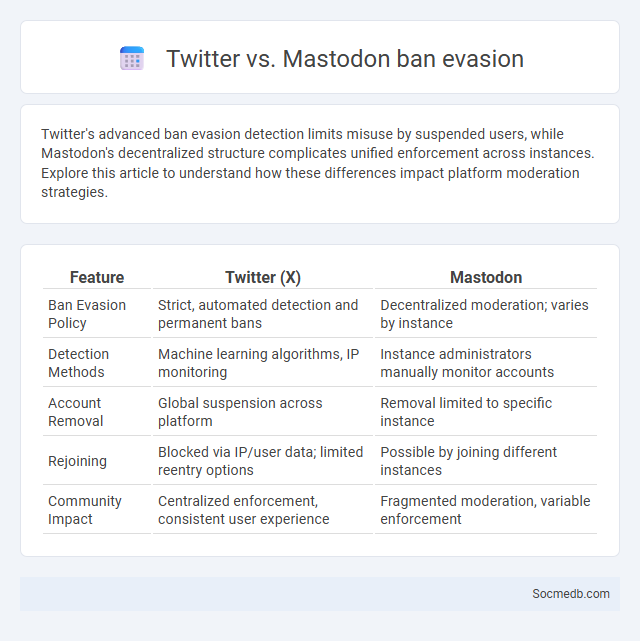
Photo illustration: Twitter vs Mastodon ban evasion
Twitter's advanced ban evasion detection limits misuse by suspended users, while Mastodon's decentralized structure complicates unified enforcement across instances. Explore this article to understand how these differences impact platform moderation strategies.
Table of Comparison
| Feature | Twitter (X) | Mastodon |
|---|---|---|
| Ban Evasion Policy | Strict, automated detection and permanent bans | Decentralized moderation; varies by instance |
| Detection Methods | Machine learning algorithms, IP monitoring | Instance administrators manually monitor accounts |
| Account Removal | Global suspension across platform | Removal limited to specific instance |
| Rejoining | Blocked via IP/user data; limited reentry options | Possible by joining different instances |
| Community Impact | Centralized enforcement, consistent user experience | Fragmented moderation, variable enforcement |
Understanding Ban Evasion: Definitions and Context
Ban evasion on social media refers to the act of circumventing account suspensions or bans by creating new profiles or using alternate identities. Understanding this behavior is crucial for maintaining platform integrity and enforcing community guidelines effectively. Protecting Your online presence involves recognizing how ban evasion undermines trust and complicates content moderation strategies.
Twitter Ban Evasion: Policies and Detection Methods
Twitter ban evasion involves users circumventing account suspensions by creating new profiles or using sophisticated tools to mask their identity, posing challenges to platform enforcement. Policies strictly prohibit evading bans, using techniques like IP masking, VPNs, or automated bot networks to maintain the ban status and ensure compliance. Your understanding of Twitter's detection methods, including behavioral analysis and machine learning algorithms, is crucial for recognizing and reporting ban evasion to maintain community integrity.
Mastodon Ban Evasion: Decentralized Challenges
Mastodon's decentralized network structure complicates the enforcement of bans, allowing users to evade restrictions by simply joining different instances. This federated model disperses control across numerous servers, reducing the effectiveness of centralized moderation efforts. Your efforts to manage online behavior must account for these unique challenges inherent to Mastodon's architecture.
Comparing Moderation Approaches: Twitter vs Mastodon
Twitter employs centralized moderation with automated systems and human reviewers enforcing strict content policies to quickly address misinformation and harmful posts, ensuring platform-wide consistency. Mastodon operates on a decentralized model where individual servers (instances) set their own moderation rules, allowing tailored community standards but resulting in varied enforcement levels across the network. This fundamental difference affects user experience by balancing uniform control on Twitter against localized autonomy on Mastodon.
User Strategies: How Ban Evasion Occurs on Each Platform
Social media platforms like Facebook, Twitter, Instagram, and TikTok experience ban evasion through tactics such as creating multiple accounts, using VPNs to hide IP addresses, and altering content to bypass automated filters. Users exploit platform-specific vulnerabilities by rapidly switching profiles, employing bots for mass reposting, or engaging in code-switching to avoid detection algorithms. Understanding these methods helps you develop more effective moderation strategies tailored to each network's unique enforcement challenges.
Technical Measures Against Ban Evasion
Technical measures against social media ban evasion include advanced IP address tracking, device fingerprinting, and behavioral analysis to detect and block users attempting to circumvent bans. Machine learning algorithms analyze usage patterns and metadata to identify suspicious accounts and automate enforcement actions. Multi-factor authentication combined with continuous monitoring enhances the effectiveness of ban evasion prevention by ensuring user verification and reducing fake account creation.
Legal and Ethical Implications of Ban Evasion
Ban evasion on social media raises significant legal concerns including violations of platform policies, infringement of terms of service, and potential criminal liability under cybersecurity laws. Ethical implications involve undermining community trust, facilitating the spread of harmful or disallowed content, and complicating efforts to enforce accountability and maintain digital safety. Enforcement agencies and platforms must balance privacy rights with strict adherence to regulations to effectively address ban evasion while protecting user freedoms.
Community Impact: Trust and Platform Integrity
Social media platforms influence community impact by shaping trust through transparent content moderation policies and combating misinformation effectively. Your engagement relies on platform integrity, which ensures authentic interactions and safeguards against harmful behaviors. Strengthening these elements fosters a safer digital environment, promoting positive social connections and collective well-being.
Future Trends in Ban Evasion and Platform Responses
Future trends in social media ban evasion reveal increasingly sophisticated methods such as the use of AI-driven bots, proxy servers, and deepfake technologies to bypass restrictions. Platforms are intensifying their responses by employing advanced machine learning algorithms, real-time monitoring systems, and cross-platform collaboration to detect and prevent evasive behaviors. Understanding these dynamics helps you stay informed about the evolving landscape of digital regulation and compliance.
Best Practices: Preventing and Addressing Ban Evasion
To prevent and address ban evasion on social media, implement robust account verification processes using multi-factor authentication to ensure user authenticity. Continuously monitor user behavior with advanced algorithms capable of detecting patterns indicative of evasion attempts, such as IP address changes or device switches. Educate Your community about the consequences of ban evasion and establish clear policies to enforce account suspensions and permanent bans efficiently.
 socmedb.com
socmedb.com